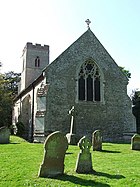Congham is a village and civil parish in the English county of Norfolk. It is situated some 6 miles (10 km) east of the town of King's Lynn and 34 miles (55 km) west of the city of Norwich.[1]
| Congham | |
|---|---|
 St. Andrew's, Congham | |
Location within Norfolk | |
| Area | 11.7 km2 (4.5 sq mi) |
| Population | 241 (2011) |
| • Density | 21/km2 (54/sq mi) |
| OS grid reference | TF714235 |
| Civil parish |
|
| District | |
| Shire county | |
| Region | |
| Country | England |
| Sovereign state | United Kingdom |
| Post town | KING'S LYNN |
| Postcode district | PE32 |
| Police | Norfolk |
| Fire | Norfolk |
| Ambulance | East of England |
| UK Parliament | |
History
editCongham's name is of Anglo-Saxon origin and derives from the Old English for a farmstead or homestead built upon a mound.[1]
In the Domesday Book of 1086, Congham is recorded as a settlement of 54 households located in the hundred of Freebridge. The village was divided between the estates of William de Warenne and Berner the Bowman.[2]
Congham Oil Mill was built in the village in 1797 and was used to process whale carcasses into oils and other products. The whales were brought to Congham from King's Lynn.[3]
In 1973, remains of a Roman villa were discovered close to Congham. Several artefacts were recovered from the site and are now exhibited in King's Lynn Museum.[4]
Since the 1960s, Congham has hosted an annual snail race.[5]
Geography
editAccording to the 2011 Census, Congham is a settlement of 241 residents living in 116 households.[6]
Congham falls within the constituency of North West Norfolk and is represented at Parliament by James Wild MP of the Conservative Party.
The River Cong rises close to the village and joins the River Babingley close to Hillington.
Congham railway bridge
editFrom the late 19th century, the Congham area was served by the Lynn & Fakenham Railway, later part of the Midland and Great Northern Joint Railway. A railway bridge at Congham was designed by the M&GNJR engineer William Marriott, pioneering an innovative system of reinforced concrete components and blockwork. In 2021, National Highways infilled the bridge with hundreds of tonnes of aggregate and concrete, but without planning permission. The railway route had been identified as part of a proposed footpath and cycleway between King’s Lynn and Fakenham, and in January 2023 King's Lynn and West Norfolk Borough Council demanded that National Highways submit a retrospective planning application.[7] National Highways' retrospective planning application received 280 objections.[8]
St. Andrew's Church
editCongham's parish church is of Norman origin and dedicated to Saint Andrew. St Andrew's features a 13th-century example of a font made from Purbeck Marble.[9]
Notable residents
edit- Henry Bellingham, Baron Bellingham of Congham (b. 1955), politician
- Robert Elwes (1819−1878), painter and traveller
- Sir Henry Spelman (c. 1562−1641), antiquarian (father of John and uncle of Henry)
- Henry Spelman (1595−1623), soldier, colonist and abductor of Pocahontas (nephew of Sir Henry and cousin of Sir John)
- Sir John Spelman (1594−1643), historian and politician (son of Sir Henry and cousin of Henry)
War memorial
editCongham's war memorial takes the form of a paper Roll of Honour located in St. Andrew's Church. It lists the following names for the First World War:
- Second-Lieutenant William R. C. Ffolkes (1898–1917), 1st Battalion, King's Royal Rifle Corps
- Able-Seaman Richard Smith (d.1917), 6th (Howe) Battalion, Royal Naval Division
- Gunner William Goodburn (d.1917), 76th Brigade, Royal Field Artillery
- Private Horace Rallison (1897–1917), 8th Battalion, Middlesex Regiment
- Private Thomas A. Harper (1875–1917), 1/5th Battalion, Royal Norfolk Regiment
- Private Edward Smith (1890–1917), 7th Battalion, Royal Norfolk Regiment
- Herbert Coomber
- E. H. Griff
- Fred Smith
And the following for the Second World War:
- Major John H. Elwes (1906–1940), 2nd Battalion, Royal Norfolk Regiment
- Leading-Seaman Stanley R. Mason (1911–1942), HMS Arethusa
- Private Wilfred Utteridge (1915–1941), 8th Battalion, Royal Norfolk Regiment[10]
References
edit- ^ "Key to English Place-names". kepn.nottingham.ac.uk. Retrieved 7 March 2024.
- ^ "Congham | Domesday Book". opendomesday.org. Retrieved 7 March 2024.
- ^ "Norfolk Mills - Congham". www.norfolkmills.co.uk. Retrieved 7 March 2024.
- ^ "Probable-Roman-villa - Norfolk Heritage Explorer". www.heritage.norfolk.gov.uk. Retrieved 7 March 2024.
- ^ Anthes, Emily (28 July 2024). "'Ready, Steady, Slow': Championship Snail Racing at 0.006 M.P.H." The New York Times. Retrieved 28 July 2024.
- ^ "Custom report - Nomis - Official Census and Labour Market Statistics". www.nomisweb.co.uk. Retrieved 7 March 2024.
- ^ "Third council stands up to National Highways' bridge infilling". The Construction Index. 26 January 2023. Retrieved 26 January 2023.
- ^ "National Highways slammed again over Great Musgrave bridge fiasco". The Construction Index. 4 July 2023. Retrieved 4 July 2023.
- ^ "Norfolk Churches". www.norfolkchurches.co.uk. Retrieved 7 March 2024.
- ^ Imperial War Museum. (2022). Retrieved December 19, 2022. https://www.iwm.org.uk/memorials/item/memorial/99365
